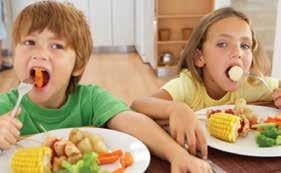
3 minute read
HEALTHY EATING
Establishing Positive Eating Habits for Children

Advertisement
Childhood is a particularly important period for forming positive behaviours related to nutrition. Children who learn and practise positive eating habits from an early age are likely to make healthy choices when they grow up. The Health Promotion and Education Team at Heart Research UK have some advice to offer on ways to help promote positive eating behaviours:
Stick to regular meal and snack times A regular eating pattern forms the basis of a healthy, balanced diet. Children love routine. Providing three meals, and two or three snacks a day, is ideal for them. Keeping mealtimes regular creates predictability and encourages a healthy appetite.
Set a good example In the long term, children and young adults are most likely to learn from how we behave rather than what we tell them. The more we can be a role model about healthy eating habits the better. Set an example to your child by showing them how you make healthy choices and how you practice positive eating habits; this could be something as simple as choosing to eat a wide variety of foods, or by ensuring you drink plenty of water.
Eat together at the table Wherever possible allow your children to eat with you. Family mealtimes offer an excellent opportunity to teach children good eating patterns as well as a time to connect and talk to each other.
Get them involved Children love to get involved in new things, so why not get them to help in the kitchen? Cooking with children and getting them involved in the meal preparation process may encourage them to try new healthy foods. Small children could be responsible for setting the table, any mixing or stirring and washing fruit and vegetables. Older children could get involved with preparing the shopping list, chopping and peeling.
Reward and punishment Carefully consider the use of food as a reward or punishment. Children have a natural ability to regulate their eating and using foods as a reward or punishment can undermine healthy eating habits, as it encourages them to eat when they are not hungry. Why not offer children non-edible objects or experiences as rewards, rather than food? For example, you could offer stickers or a trip to the park, as an alternative treat. Also don’t underestimate the power of verbal praise.
Clean your plate Pressuring children to ‘clean their plate’ may work in the short term, but it doesn’t promote long term healthy eating. It can also lead to a distaste for those nutritious foods they are being forced to eat. Instead, help a child to feel supported, safe, and relaxed at the dinner table, by creating positive interactions with food. When a child feels safe, they are much more likely to want to eat and try new foods.
Offering choice As parents, we can’t give our children complete control over food, but we can guide them on making healthy choices. For young children, you may give them to 2 or 3 options to choose from e.g., ‘would you like either toast or cereal for breakfast?’. Guided choices can be helpful as they enable a child to feel like they have their say and a degree of control, without feeling overwhelmed.

Eating better isn’t just about watching calories, it’s about making sure you are eating the right type of foods and in the right portion sizes. Go to www.heartresearch.org.uk/healthy-tips for more tips on how to stay healthy. You will also find Healthy Heart recipes there and a downloadable Healthy Heart cookbook.









